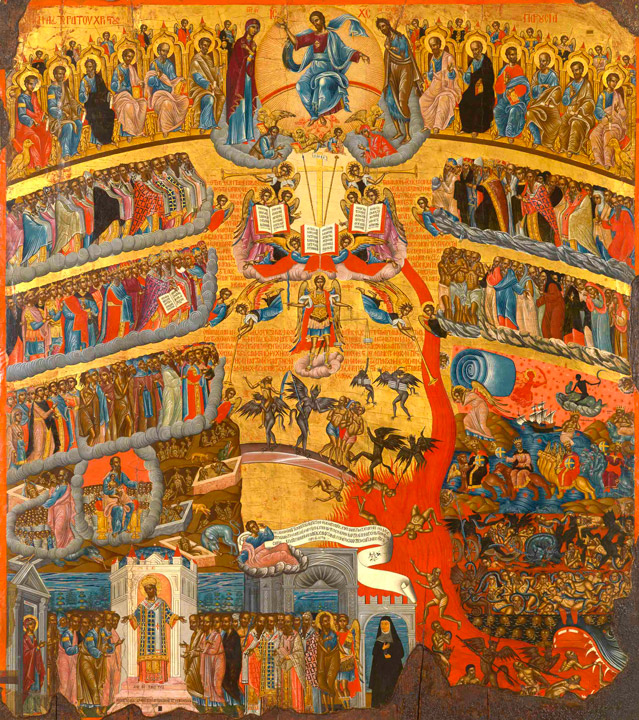
Fr. Dr. Augustine Sokolovski
The fourth preparatory Sunday before Great Lent is called the Week of the Last Judgment. During the liturgy of this day, the final part of the 25th chapter of the Gospel of Matthew is read, verses 31-46, in which the Evangelist, through the mouth of the Lord Jesus, or, better, the Lord Jesus Himself, in the Holy Spirit, by the hand of the Evangelist speaks about the Judgment. This Judgment will take place at the end of history.
The picture of the Judgment, an event that will forever determine the fate of all mankind, unfolds in just sixteen verses. Hardly any of the Gospel texts, besides the stories of the Nativity, the Cross and the Resurrection, to such an extent has shaped and continues to determine the development of the entire world for the past two thousand years. Without these lines, the history of the world would be different.
“Come, you blessed of My Father, inherit the kingdom prepared for you from the foundation of the world: for I was hungry, and you gave me food; I was thirsty and you gave Me something to drink; I was a stranger and you accepted Me; I was naked and you clothed Me; I was sick and you visited Me; I was in prison, and you came to Me,” says the Lord (34–36). Everyone is called to salvation. This corresponds to the common criteria of justification and condemnation.
The very idea of charity, service to others, selflessness and self-sacrifice, not for the sake of selfishness or profit, but for the sake of the neighbor and for the sake of God, over time created a system of health care and social assistance that continues to save millions of lives, even if its original biblical rationale has faded into the shadows over time.
The thought of the Last Judgment shaped the contours of human conscience and gave specific, great, unique features to culture, art and literature. The image of the Last Judgment is the only image of the future in iconography. It adorns the great cathedrals of antiquity.
“When the Son of Man comes in His glory, and all the holy angels with Him, then He will sit on the throne of His glory, and all nations will be gathered before Him” (31-32). Thus, the Lord Himself testifies to the universality of the upcoming Judgment. “All nations” is also a prophecy that the call to communion with the One True God will become universal, and will no longer be limited to one chosen people, as it was in the Old Testament.
The words about “all nations” are evidence that the preaching of the good news about Christ will be worldwide, and the Lord Jesus is the Messiah who came to the salvation of all. Belief in the Second Coming of the Lord and the Last Judgment is a given of the biblical New Testament Revelation and Christian dogma. “I believe in the Lord Jesus, who will come again in glory to judge the living and the dead,” says the Creed. The Lord Jesus will return to earth in glory and bring judgment upon all the nations of the earth.
The content of the Parable of the Last Judgment is extremely clear. Cases for which the righteous are acquitted and the condemned are rejected do not require allegory. However, this text is one of the most difficult to understand.
Theologians and preachers of all times, starting from the patristic era, have asked the question why the Lord Jesus said nothing about faith or dogma. He spoke only about elementary human needs - food, drink, clothing and shelter, as well as duty towards the sick and deprived of liberty, as criteria for justification or condemnation. This deliberate contradiction in the Gospel text, one of the few contradictions introduced into Scripture by the Holy Spirit Himself, will forever remain without a final answer.
Perhaps, if the Lord, in one form or another, mentioned the truths of faith, this would become a colossal and insurmountable reason for pride for all future Christians. But before the tragic complexity of contact with one’s neighbor in help and service, everyone is equal. Doing good deeds without any self-interest is the essence of the moral teaching of the New Testament.
At the same time, the entire story about the Last Judgment is, in fact, a testimony about Christ Himself. An important feature of the Gospel of Matthew is its extreme attention to detail. The fact that the Parable of the Last Judgment, as this text is often called by interpreters, was placed by the evangelist immediately before the beginning of the story of the Passion and Death of the Lord on the Cross speaks of its extreme importance. In fact, it sums up the entire earthly life of the Lord.
Jesus bids farewell to His Disciples, those who believed and, most importantly, those who rejected Him, and declares that He will henceforth return in glory at the end of history for Judgment. The apostolic circle will see Him after the Resurrection. Those who did not believe in Him during His earthly preaching will never see Him on earth again. The sixteen verses of the Gospel of Matthew became the foundation of human relationships and a guide to salvation. It is important to learn them by heart and repeat them constantly, like a prayer for help.